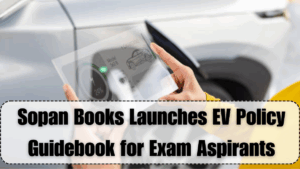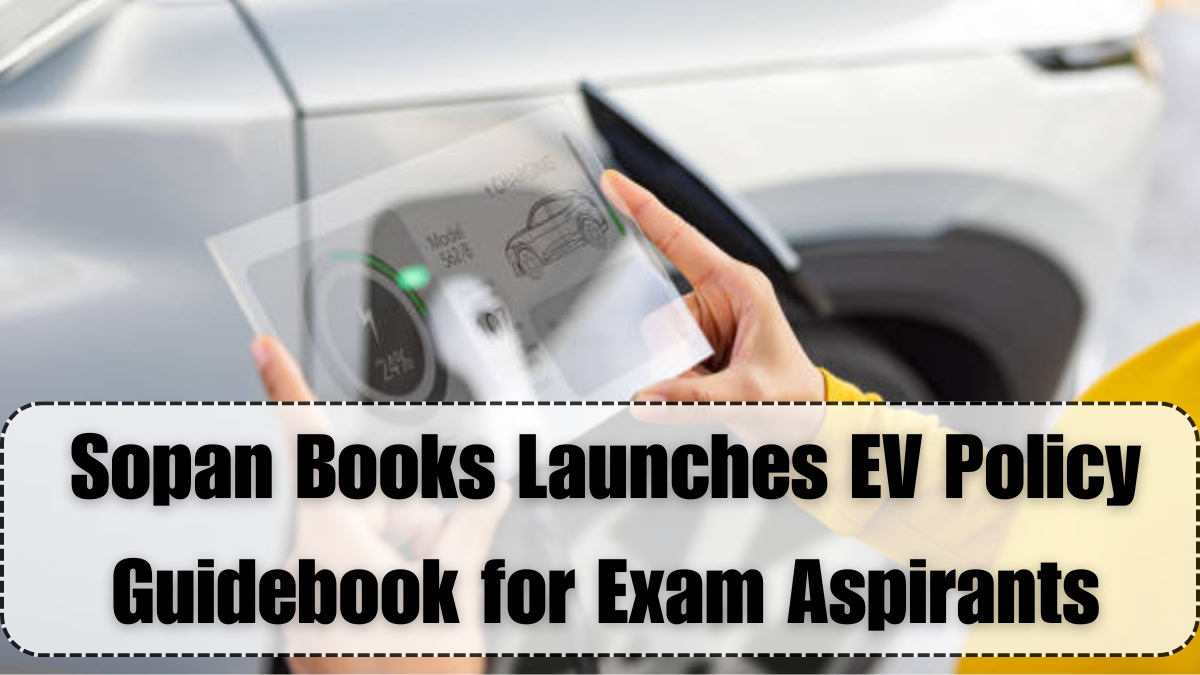EV policy guide launched by Sopan Books is making waves across academic and competitive exam communities in India. This new publication is specifically curated for UPSC aspirants, public administration students, and professionals preparing for government roles. It offers a detailed breakdown of India’s electric vehicle regulations, emission standards, manufacturing incentives, and national mobility strategies — all in one easy-to-read volume.
As EV adoption accelerates across India, there’s a growing need for well-informed candidates who understand policy formulation, green mobility, and sustainable governance. This EV policy book fills that gap, giving learners an updated, structured, and exam-ready resource that covers central and state-level initiatives. It is already being recommended by educators and coaching centers preparing students for civil service and other competitive exams.

What the EV Policy Guide Covers
The EV policy guide includes everything from historical evolution to the latest updates in EV governance. Written in a student-friendly format, it breaks down complex jargon and regulatory clauses using charts, summaries, and visual aids.
Topics covered in the EV policy book include:
-
National Electric Mobility Mission Plan (NEMMP)
-
Faster Adoption and Manufacturing of Electric Vehicles (FAME I & II)
-
State-specific EV policies (Delhi, Maharashtra, Tamil Nadu, etc.)
-
GST, import duties, and subsidy structures
-
Scrappage policy and retrofitting norms
-
Charging infrastructure and battery standards
-
Role of NITI Aayog and Ministry of Heavy Industries
This makes the guide one of the most comprehensive student prep tools available for understanding the government’s approach to green transport.
Ideal for Students Preparing for Government Exams
Competitive exams in India, especially UPSC, State PSCs, and SSC, are increasingly focusing on current affairs, environmental policy, and technological shifts. This EV policy guide helps students master these subjects without the need to consult multiple sources.
How this EV policy book supports student prep:
-
Chapter-wise summaries for quick revision
-
Model MCQs and descriptive questions at the end of each chapter
-
Timelines and flowcharts for policy milestones
-
Budget and economic implications explained clearly
-
Real-life case studies of EV rollouts and challenges
It aligns with the exam syllabus and also builds a strong conceptual base for interviews and group discussions.
Sopan Books and Their Educational Mission
Sopan Publishing continues its leadership in academic resources with the launch of this EV-focused manual. Having already released EV technical guides and industry books, the EV policy guide now strengthens its offering for the student segment.
Educational features of this EV policy book:
-
Compiled and reviewed by retired bureaucrats and subject matter experts
-
Available in English, with Hindi version in development
-
Affordable pricing to reach rural and tier-2 students
-
Compatible with online learning platforms and digital classrooms
-
Also useful for think tanks, NGOs, and researchers studying climate law and transport policy
With this release, Sopan reinforces its role in bridging the gap between government frameworks and youth understanding of sustainable mobility.
FAQs
What is the EV policy guide by Sopan Books?
It is a detailed handbook on electric vehicle policies in India, created to support student prep for government exams.
Who should use this EV policy book?
UPSC aspirants, college students, policymakers, and anyone interested in government EV regulations and frameworks.
Does the guide include recent policy updates?
Yes, it covers the latest developments in FAME II, retrofitting rules, and state-level EV incentives.
Are practice questions included?
Absolutely. The EV policy guide includes both objective and subjective questions aligned with competitive exam patterns.
Where can I buy the book?
It’s available via Sopan Publishing’s official channels, online platforms, and major bookstores across India.
Click here to know more.
